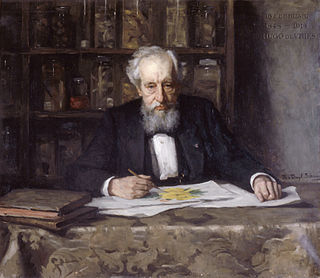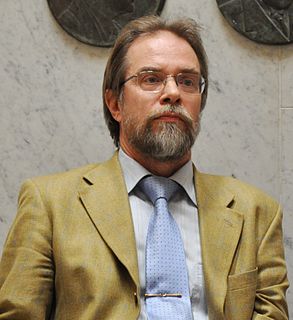Related Research Articles

Genetic drift is the change in the frequency of an existing gene variant (allele) in a population due to random sampling of organisms. The alleles in the offspring are a sample of those in the parents, and chance has a role in determining whether a given individual survives and reproduces. A population's allele frequency is the fraction of the copies of one gene that share a particular form.

Evolutionary biology is the subfield of biology that studies the evolutionary processes that produced the diversity of life on Earth. In the 1930s, the discipline of evolutionary biology emerged through what Julian Huxley called the modern synthesis of understanding, from previously unrelated fields of biological research, such as genetics and ecology, systematics and paleontology.
Genetic load is the difference between the fitness of an average genotype in a population and the fitness of some reference genotype, which may be either the best present in a population, or may be the theoretically optimal genotype. The average individual taken from a population with a low genetic load will generally, when grown in the same conditions, have more surviving offspring than the average individual from a population with a high genetic load. Genetic load can also be seen as reduced fitness at the population level compared to what the population would have if all individuals had the reference high-fitness genotype. High genetic load may put a population in danger of extinction.

Sewall Green Wright FRS(For) HFRSE was an American geneticist known for his influential work on evolutionary theory and also for his work on path analysis. He was a founder of population genetics alongside Ronald Fisher and J. B. S. Haldane, which was a major step in the development of the modern synthesis combining genetics with evolution. He discovered the inbreeding coefficient and methods of computing it in pedigree animals. He extended this work to populations, computing the amount of inbreeding between members of populations as a result of random genetic drift, and along with Fisher he pioneered methods for computing the distribution of gene frequencies among populations as a result of the interaction of natural selection, mutation, migration and genetic drift. Wright also made major contributions to mammalian and biochemical genetics.

Mutationism is one of several alternatives to evolution by natural selection that have existed both before and after the publication of Charles Darwin's 1859 book, On the Origin of Species. In the theory, mutation was the source of novelty, creating new forms and new species, potentially instantaneously, in sudden jumps. This was envisaged as driving evolution, which was thought to be limited by the supply of mutations.

Douglas Joel Futuyma is an American evolutionary biologist. He is a Distinguished Professor in the Department of Ecology and Evolution at Stony Brook University in Stony Brook, New York and a Research Associate on staff at the American Museum of Natural History in New York City. His research focuses on speciation and population biology. Futuyma is the author of a widely used undergraduate textbook on evolution and is also known for his work in public outreach, particularly in advocating against creationism.
Brian Charlesworth is a British evolutionary biologist at the University of Edinburgh, and editor of Biology Letters. Since 1997, he has been Royal Society Research Professor at the Institute of Evolutionary Biology (IEB) in Edinburgh. He has been married since 1967 to the British evolutionary biologist Deborah Charlesworth.

Ilkka Aulis Hanski was a Finnish ecologist at the University of Helsinki, Finland. The Metapopulation Research Center led by Hanski, until his death, has been nominated as a Center of Excellence by the Academy of Finland. The group studies species living in fragmented landscapes and attempts to advance metapopulation ecology research. Metapopulation ecology itself studies populations of plants and animals which are separated in space by occupying patches.
The Thomas Hunt Morgan Medal is awarded by the Genetics Society of America (GSA) for lifetime contributions to the field of genetics.
The Eminent Ecologist Award is prize awarded annually to a senior ecologist in recognition of an outstanding contribution to the science of ecology. The prize is awarded by the Ecological Society of America. According to the statutes, the recipient may be from any country in the world. However, in practice very few non-U.S. citizens have received the award. The awardee receives lifetime membership in the society.
Mary Jane West-Eberhard is an American theoretical biologist noted for arguing that phenotypic and developmental plasticity played a key role in shaping animal evolution and speciation. She is also an entomologist notable for her work on the behavior and evolution of social wasps.
Russell Scott Lande is an American evolutionary biologist and ecologist, and an International Chair Professor at Centre for Biodiversity Dynamics at the Norwegian University of Science and Technology (NTNU). He is a fellow of the Royal Society and a member of the United States National Academy of Sciences.
The Weldon Memorial Prize, also known as the Weldon Memorial Prize and Medal, is given yearly by the University of Oxford. The prize is to be awarded
without regard to nationality or membership of any University to the person who, in the judgement of the electors, has, in the ten years next preceding the date of the award, published the most noteworthy contribution to the development of mathematical or statistical methods applied to problems in Biology.
In macroecology and community ecology, an occupancy frequency distribution (OFD) is the distribution of the numbers of species occupying different numbers of areas. It was first reported in 1918 by the Danish botanist Christen C. Raunkiær in his study on plant communities. The OFD is also known as the species-range size distribution in literature.
Robert Treat "Bob" Paine III was an American ecologist who spent most of his career at the University of Washington. Paine coined the keystone species concept to explain the relationship between Pisaster ochraceus, a species of starfish, and Mytilus californianus, a species of mussel.
Janis Antonovics FRS is an American biologist, and Lewis and Clark Professor of Biology, at University of Virginia.
Montgomery Wilson Slatkin is an American biologist, and professor at University of California, Berkeley.

Rudolf Albert Raff was an American biologist, and James H. Rudy Professor of Biology at Indiana University. He was known for research in, and promotion of, evolutionary developmental biology. He was also director of the Indiana Molecular Biology Institute.
Jeanne Altmann is a professor emerita and Eugene Higgins Professor of ecology and evolutionary biology currently at Princeton University. She is known for her research on the social behaviour of baboons and her contributions to contemporary primate behavioural ecology. She is a founder and co-director of the Amboseli Baboon Research Project. Her paper in 1974 on the observational study of behaviour is a cornerstone for ecologists and has been cited more than 10,000 times. She is a Fellow of the National Academy of Sciences, and the American Philosophical Society (2020)
Ruth Geyer Shaw is a professor and principal investigator in the Department of Ecology, Evolution and Behavior at the University of Minnesota. She studies the processes involved in genetic variation, specializing in plant population biology and evolutionary quantitative genetics. Her work is particularly relevant in studying the effects of stressors such as climate instability and population fragmentation on evolutionary change in populations. She has developed and applied new statistical methods for her field and is considered a leading population geneticist.
References
- ↑ Secretary's Report. 1992. (1992) American Naturalist 140:1058. JSTOR 2462935
- ↑ Wilbur, H. M. (1998). "1996 Sewall Wright Award: Robert T. Paine". The American Naturalist. 151 (1): i–t. doi:10.1086/513833. PMID 18811418.
- ↑ Gill, D. E. (1998). "Sewall Wright Award 1997: Douglas Joel Futuyma". The American Naturalist. 152: i. doi:10.1086/513674. PMID 18811396.
- ↑ Holt, R. D.; McPeek, M. A.; Moran, N. A.; Seger, J. (1999). "1998 Sewall Wright Award: William Donald Hamilton". The American Naturalist. 153: i. doi:10.1086/303156.
- ↑ Jaenike, J. (2000). "1999 Sewall Wright Award: Janis Antonovics". The American Naturalist. 155: i. doi:10.1086/303305.
- ↑ Antonovics, J. (2002). "2001 Sewall Wright Award: Ilkka A. Hanski". The American Naturalist. 159: i. doi:10.1086/338777. PMID 18707395.
- ↑ Huey, R. B. (2003). "Linda Partridge". The American Naturalist. 161: i. doi:10.1086/367716. PMID 12650458.
- ↑ Zuk, M. (2004). "2003 Sewall Wright Award". The American Naturalist. 163: i. doi:10.1086/381946.
- ↑ McPeek, M. (2005). "2004 Sewall Wright Award". The American Naturalist. 165: i. doi:10.1086/427345.
- ↑ Turelli, M. (2006). "2005 Sewall Wright Award". The American Naturalist. 167: i. doi:10.1086/498280. PMID 17209245.
- ↑ Lande, R (2007). "2006 Sewall Wright Award. Brian Charlesworth". The American Naturalist. 169 (1): iii. doi:10.1086/510731. PMID 17209244.
- ↑ Price, T. (2008). "2007 American Society of Naturalists Awards". The American Naturalist. 171: iii. doi:10.1086/524694.
- ↑ Antonovics, J. (2009). "2008 American Society of Naturalists Awards". The American Naturalist. 173: iv. doi:10.1086/593708.
- ↑ Ketterson, E. (2010). "2009 American Society of Naturalists Awards". The American Naturalist. 175: ii. doi:10.1086/649134.
- ↑ "Sewall Wright Award: Ruth Shaw". American Society of Naturalists. February 24, 2017.